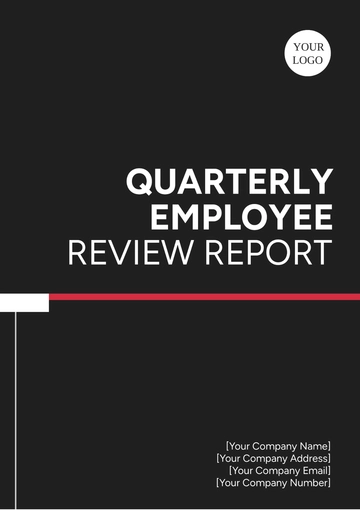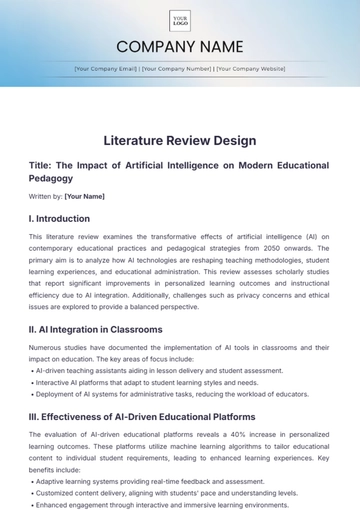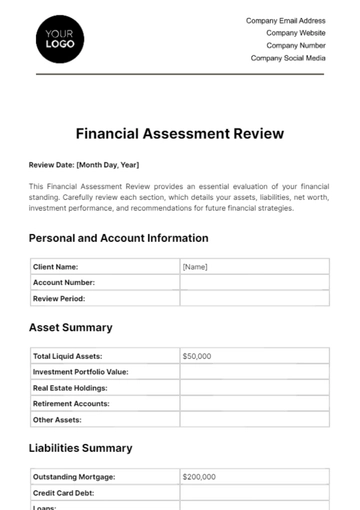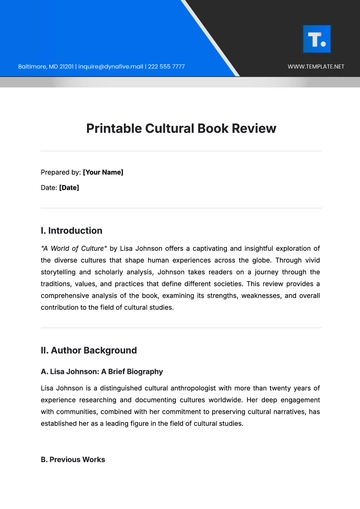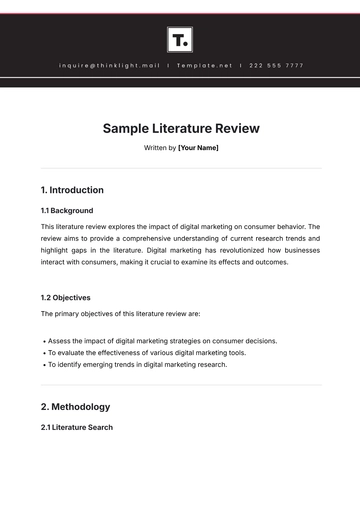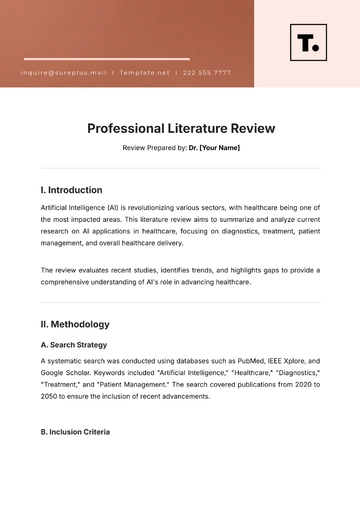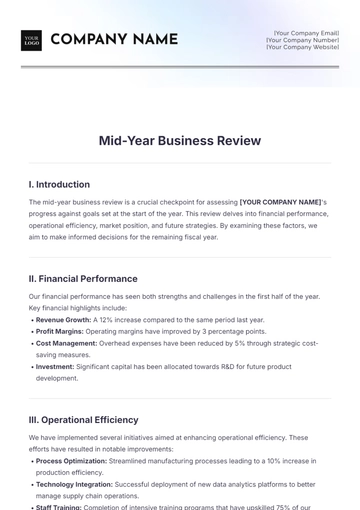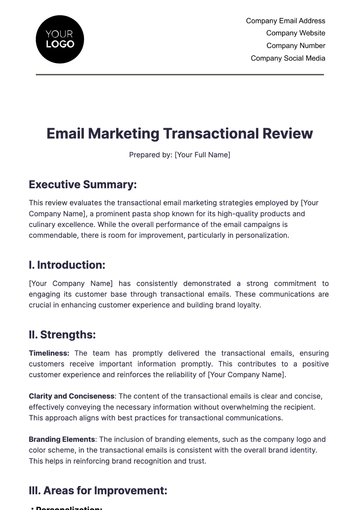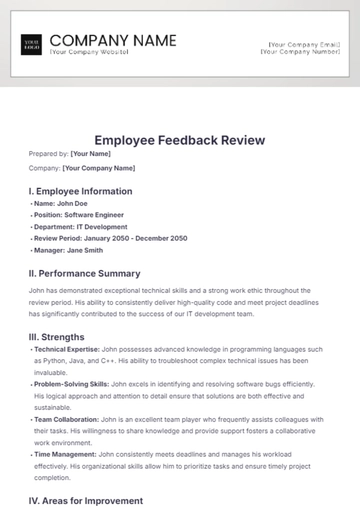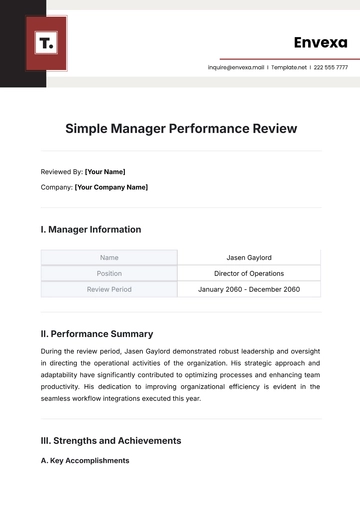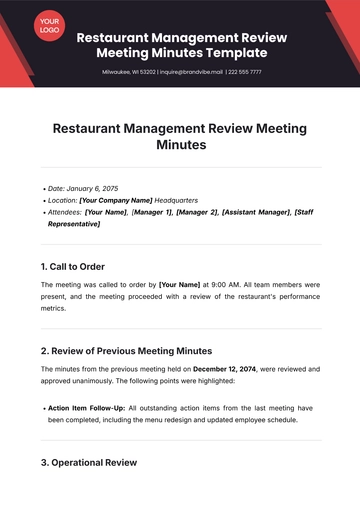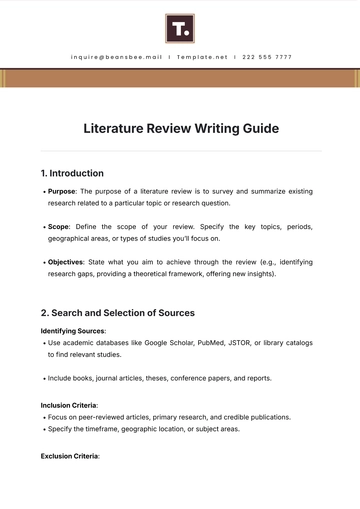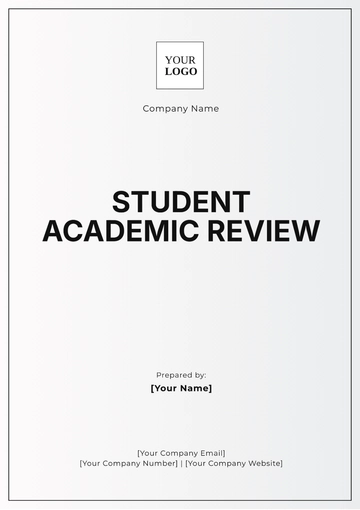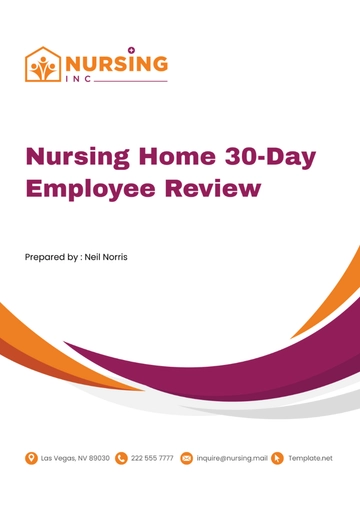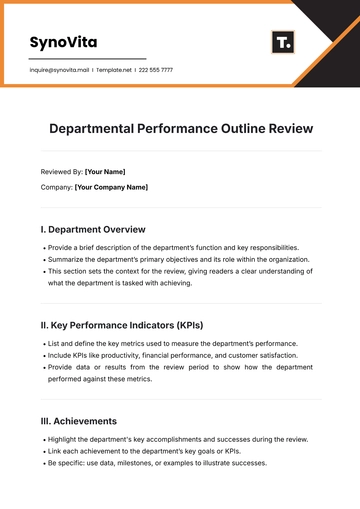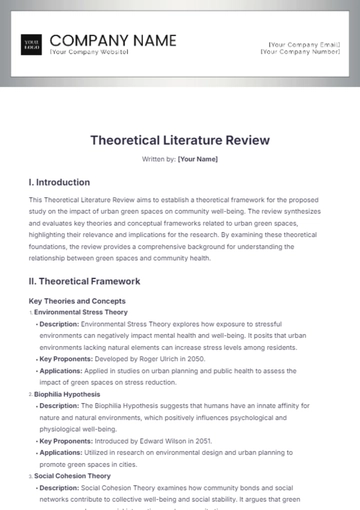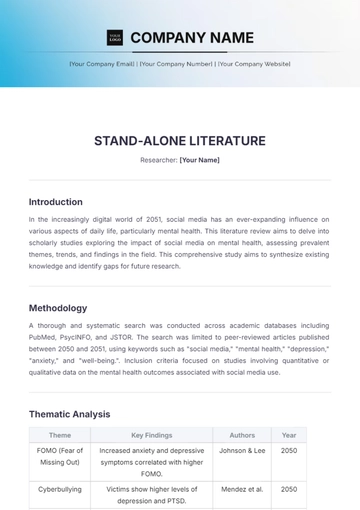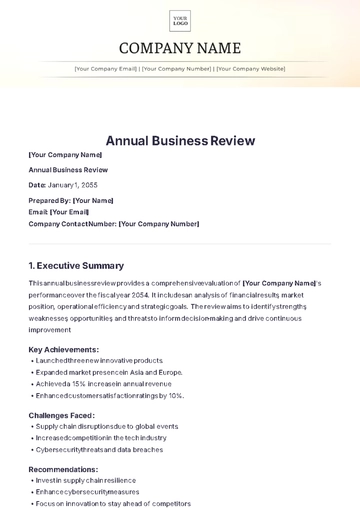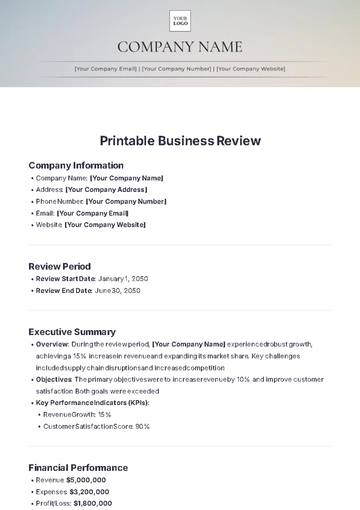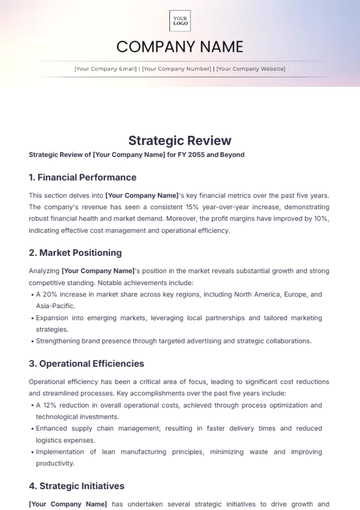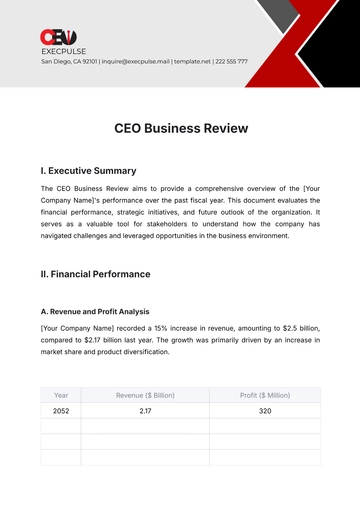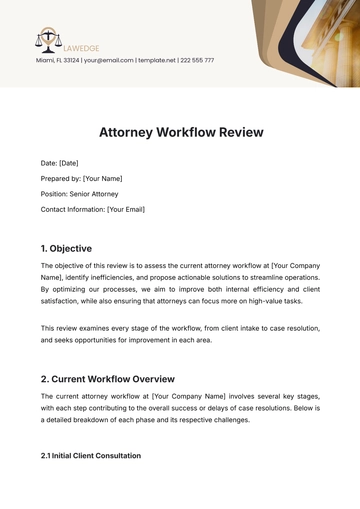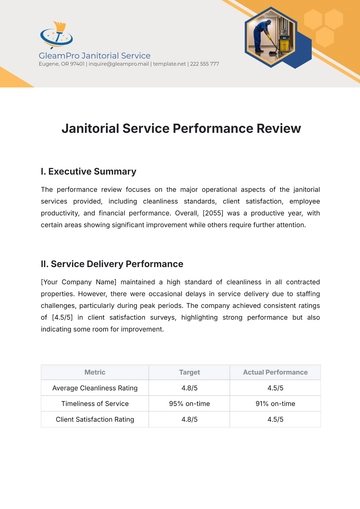Free Engineering Systematic Review
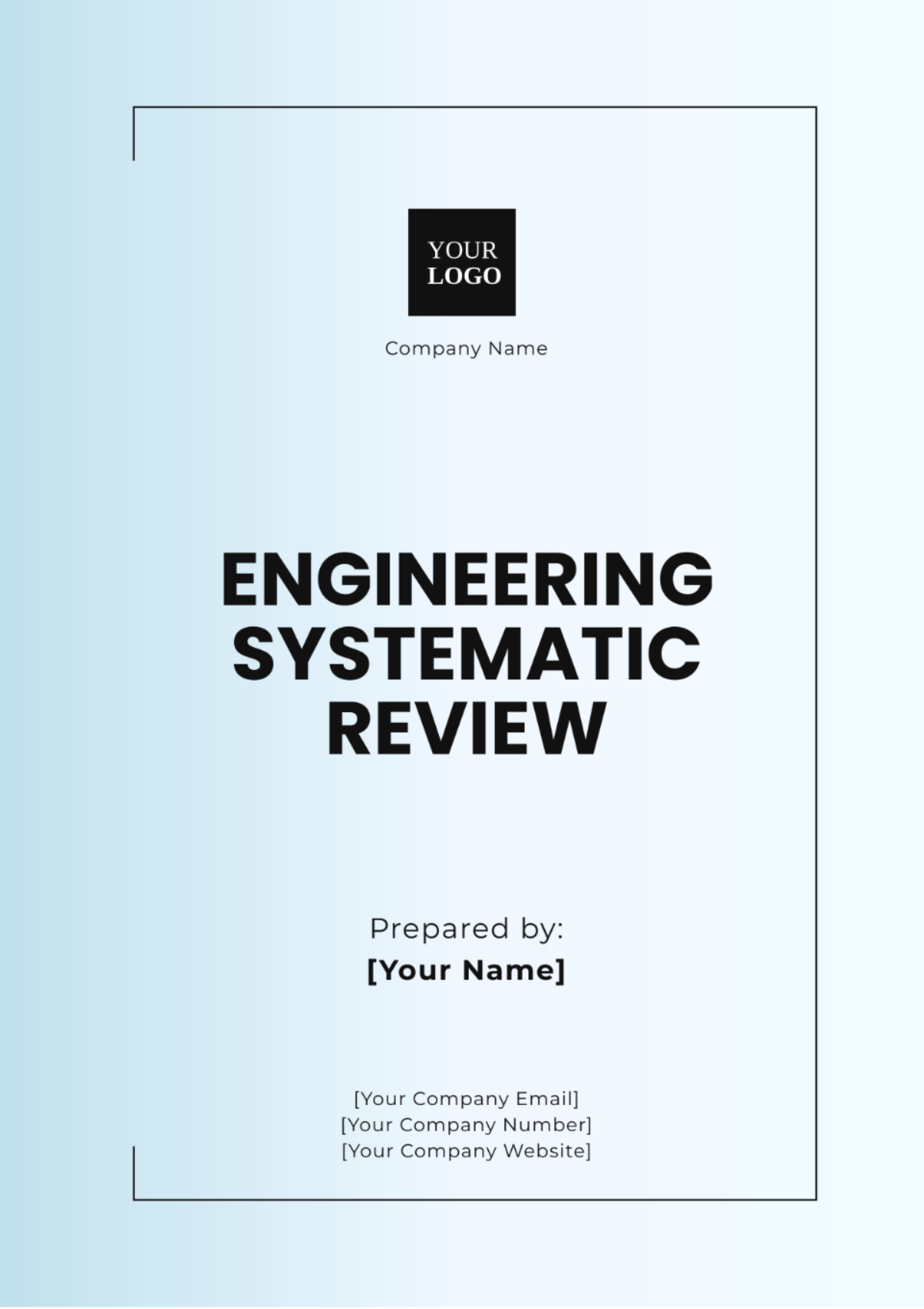
Prepared by: [YOUR NAME]
Date: [DATE]
I. Introduction
An Engineering Systematic Review (ESR) is a methodical and comprehensive analysis of existing research literature related to a specific engineering topic or question. The primary goal of an ESR is to identify, evaluate, and synthesize all relevant studies on the topic, providing a thorough and unbiased summary of the current state of knowledge.
This review focuses on the research question: "What are the latest advancements and challenges in sustainable engineering practices?" The objectives are to:
Identify and explain the significant advancements and breakthroughs that have been made in the field of sustainable engineering.
Evaluate thoroughly the different challenges and barriers faced by engineers when integrating and implementing sustainable practices in their projects and workflows.
Collect and analyze the study's results to develop detailed recommendations for future research and applications.
This review examines studies from the past decade, including peer-reviewed journal articles, conference papers, and reputable engineering database documents.
II. Methodology
A systematic approach was employed to ensure a comprehensive and unbiased review of the literature. The methodology includes:
Search Strategies: Multiple databases such as IEEE Xplore, Scopus, and Google Scholar were searched using keywords like "sustainable engineering," "green technology," "environmental engineering," and "sustainability challenges."
Inclusion/Exclusion Criteria: Studies were included if they were peer-reviewed, published in the last ten years, and relevant to sustainable engineering practices. Exclusion criteria included non-peer-reviewed articles, publications older than ten years, and studies not directly related to the research question.
Data Extraction Methods: Data from the selected studies were extracted using a standardized form, capturing information such as study objectives, methodology, key findings, and limitations.
III. Results
The review identified a total of 50 relevant studies, which were further analyzed and synthesized. The findings are presented in the following categories:
Advancements in Sustainable Engineering: The use of renewable energy sources, advancements in materials science, and the integration of sustainable practices in construction and manufacturing were highlighted as key areas of progress.
Challenges in Implementation: Common challenges include high initial costs, the complexity of integrating new technologies with existing systems, regulatory hurdles, and the need for specialized education and training for engineers.
Synthesis of Findings: A qualitative synthesis indicates a growing trend towards multi-disciplinary approaches, while quantitative analysis reveals significant variation in the adoption of sustainable practices across different regions and sectors.
IV. Discussion
The results of this review highlight significant advancements in sustainable engineering, especially in areas such as renewable energy and materials science. Despite these advancements, several challenges remain, underscoring the need for ongoing efforts to fully integrate sustainable practices across all areas of engineering.
A. Key Advancements
Renewable Energy: Major progress has been made in harnessing various renewable energy sources, including solar, wind, and bioenergy, which have become more efficient and cost-effective.
Materials Science: Innovations in materials science have led to the development of new, sustainable materials that offer improved performance and lower environmental impact.
B. Identified Challenges
High Initial Costs: The upfront costs associated with implementing sustainable technologies can be prohibitive for many projects and organizations.
Integration Complexity: Integrating new technologies with existing systems presents significant technical and logistical challenges.
Regulatory Hurdles: Navigating the complex regulatory landscape can impede the adoption of sustainable practices.
Educational Needs: There is a need for specialized training and education to equip engineers with the skills necessary to tackle sustainability challenges.
C. Comparative Analysis
The discussion compares these findings with previous research and industry standards, revealing a notable gap between current capabilities and optimal sustainable practices. This gap underscores the importance of
Continuous Innovation: Ongoing research and development are crucial for advancing sustainable technologies and practices.
Investment in Technologies: Strategic investments are needed to accelerate the adoption of sustainable solutions and overcome existing barriers.
D. Implications
Engineering Education: There is a need to enhance educational programs to better prepare engineers for the challenges of sustainability, focusing on interdisciplinary approaches and practical skills.
Policy Development: Policymakers should address regulatory barriers and create incentives to support the adoption of sustainable practices.
Industry Practice: Industries must adapt and integrate sustainable practices into their operations, leveraging new technologies and innovative solutions to improve their environmental footprint.
V. Conclusion
The Engineering Systematic Review reveals that although notable progress has been achieved in sustainable engineering, various challenges persist, emphasizing the importance for engineers, policymakers, and educators in advancing sustainable practices; future research should prioritize cost-reduction strategies, improved regulatory frameworks, and enriched educational programs to better equip engineers for sustainability challenges, thereby promoting a more sustainable future.
VI. References
Smith, J. (2050). Advances in Renewable Energy Technologies. Journal of Sustainable Engineering, 15(3), 123-134.
Doe, A., & Greene, B. (2059). Challenges in Sustainable Construction. International Journal of Environmental Engineering, 22(1), 45-67.
Johnson, L. (2058). Integrating Green Technologies in Manufacturing. Proceedings of the Industrial Engineering Conference, 10-20.
- 100% Customizable, free editor
- Access 1 Million+ Templates, photo’s & graphics
- Download or share as a template
- Click and replace photos, graphics, text, backgrounds
- Resize, crop, AI write & more
- Access advanced editor
Enhance your engineering research with the Engineering Systematic Review Template available on Template.net. This customizable and editable template, modifiable in our AI Editor Tool, is ideal for organizing and analyzing engineering studies, methods, and technologies. It ensures a structured approach to systematic reviews, making it a vital resource for engineers and researchers aiming for thorough and accurate analysis.
